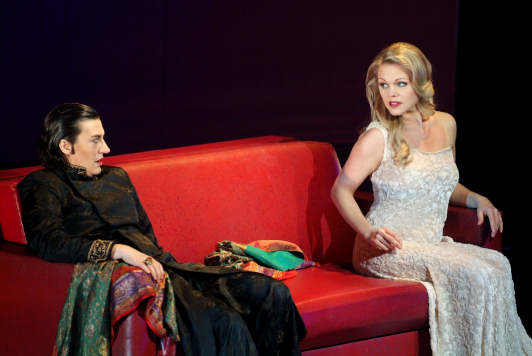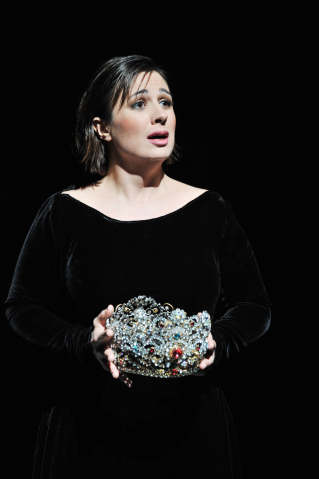Other Links
Editorial Board
-
Editor - Bill Kenny
-
Deputy Editor - Bob Briggs
Founder - Len Mullenger
Google Site Search
SEEN
AND HEARD INTERNATIONAL OPERA REVIEW
Monteverdi, L’Incoronazione
di Poppea:
Soloists,
Orquestra Barroca del Gran Teatre del Liceu,
Conductor, Harry Bicket
Gran Teatre del Liceu de Barcelona 3 & 4. 2.2009 (JMI)
It is interesting that in the recent history of
opera, works from the 17th and 18th
centuries have become familiar fare, and it is
difficult to believe that this is the first time that
L' Incoronazione di Poppea has been presented
at the Liceu, 366 years after its premiere in Venice.
Maite Beaumont was a magnificent Ottavia, difficult
to surpass. She sang her two great scenes, the
sorrowful “Disprezzata Regina” and “Addio,
Co-production: Bayerische Staatsoper and Welsh
National Opera
Director: David Alden
Sets: Paul Steinberg
Costumes: Buki Shiff
Lighting: Pat Collins
Casts:
Poppea: Miah Persson/Isabel Bayrakdarian
Nero: Sarah Connolly/Kate Aldrich
Ottavia: Maite Beaumont/Marina Rodríguez-Cusí
Ottone: Jordi Doménech
Seneca: Franz-Josef Selig/Mirco Palazzi
Drusilla: Ruth Rosique
Nurse/Arnalta: Dominique Visse/Xavier Sabata
Amor: Olatz Saitúa
Fortuna/Damigella: Judith Van Wanroij
Virtú/Pallas/Venus: Marisa Martins
Valleto: William Berger
Lucano/Others:
Guy de Mey
Mercuria/Others: Josep Miquel Ramon
Liberto/Others: Francisco Vas

Nero: Sarah Connolly
and Poppea: Miah Persson
For this, its first production of a Monteverdi
opera, the Liceu has chosen one of the most
interesting stage directors of the present day,
particularly in the baroque repertoire. I am
referring to David Alden, whose works were presented
so frequently in Munich during the time of Sir Peter
Jonas.
This production is not a new work, since it was
premiered in Cardiff in 1997, has been revived on
numerous occasions in Munich and has also been seen
at the Palais Garnier in Paris. David Alden knows how
to play with the sensuality and the humour of the
opera, and directs actors magnificently. With
imagination, spectacular lighting and careful
direction, Alden was able to present Poppea’s scenes
with an outstanding sensuality and eroticism. The
costumes are very bright and colourful, emphasizing
the figure of Poppea, making her into a real movie
star. The production could have seemed iconoclastic,
but in my opinion was not.
The magnificent libretto of Gian Francesco Busenello
(combined with the music of Monteverdi) gives us
several comic roles (the Nurse, Arnalta, Drusilla,
Valletto and the Damigella) and Alden emphasises the
humour of all of them. More debatable is Alden’s
interpretation of the three Goddesses, especially
Amor, as belonging to the comic cast. However, in
other ways Alden is very respectful towards the music
and there is no sign of provocation in his treatment
of the great arias for Ottavia nor in the duets of
Poppea and Nero.
Harry Bicket was in charge of the musical direction.
He is a specialist in this type of music and he gave
a good performance, particularly in the more intimate
passages. He gave very good support to the singers,
although the intensity was not always at the same
level, and lacked a little spark in the comic pages.
The reduced Liceu’s Baroque Orchestra, gave a good
performance under his direction. The large cast
demanded by this opera worked very well, without low
points and with some extraordinary contributions.
It is difficult to imagine a more credible and
convincing Poppea than the Swedish soprano Miah
Persson. Her beauty, outstanding figure, her acting
abilities and her beautiful voice, together with her
great expressiveness, make her the Poppea of one’s
dreams. It did not seem at all strange to me that
Nero fell in love with her. After offering a splendid
performance, she was wonderful in the final duet “Pur
ti miro, pur ti godo”, a page that it is not
Monteverdi’s.
In the second cast Poppea was played by the Canadian
Isabel Bayrakdarian, who had to resolve the
difficulties of the score and the memory of Miah
Persson the previous evening. I must say that this
new Poppea seemed to be in a different league to Ms
Persson and the performance was not the same
extraordinary experience.
Vesselina Kasarova cancelled her engagement to play
Nero, which didn’t surprise me. Sarah Connolly, who
was scheduled to perform in the second cast, replaced
her and it was a very fortunate replacement. This was
one of the best performances I have seen from her, as
she was very credible on stage and sang wonderfully,
and was an outstanding Nero.
The American singer Kate Aldrich was also very
good as Nero on the following night and was by far
the best performer in the second cast. She was a very
convincing interpreter, looked right and had a
pleasant and homogenous voice.

Maite Beaumont - Ottavia
Carlos Mena cancelled as Ottone, the
Poppea's lover in
the opera, and her husband in real life. He was
replaced by the Catalan countertenor Jordi Doménech.
He was not spectacular vocally, but was a good
combination of singer and actor.
Drusilla, Poppea’s servant (or her friend in
this production) was interpreted by Ruth Rosique, who
was quite good. Her voice is well suited to the role
and she is also a good actress.
Franz-Josef Selig brought nobility and the necessary
stoicism to Séneca, singing the part with a voice
very well suited to the character.
Mirco Palazzi was the second cast Séneca and
he gave a good interpretation. This young bass has an
interesting voice in the centre register, but lacks
weight at the bottom and is rather colourless in the
higher register.
Countertenor Dominique Visse doubled as the Nurse
and Arnalta and was a superb comedian. Vocally, he
was not at his best, but his stage presence was
wonderful. Xavier Sabata was better in vocal terms,
but he was not so funny.
In the secondary roles I should mention first of all
William Berger as Valleto. He is a very interesting
tenor, who combines a good voice with wonderful
acting ability.
There were a few empty seats at both performances,
and these increased after each interval. At the final
bows there was great appreciation for Miah Persson,
Maite Beaumont, Sarah Connolly, Kate Aldrich and
Harry Bicket. David Alden was received with both
cheers and boos.
José M. Irurzun
Pictures © Antoni Bofill
Back
to Top
Cumulative Index Page
